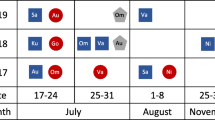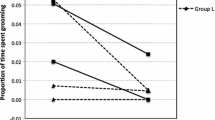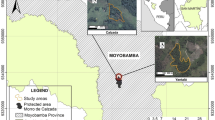Abstract
Studies of infant development and parental behavior in free-ranging owl monkeys have been constrained by their nocturnal habits. Taking advantage of the cathemeral activity pattern of Aotus azarai azarai in the Argentinean Chaco, we describe the development of a cohort of free-ranging infants born in an owl monkey population in Formosa Province. We observed 7 infants, whose birth dates are known to the nearest week, to record details of their development and care between October 1999 and March 2000. We collected 92 h of behavioral data in 76 sessions. The infants were almost never off the parents during the first 4 wk of life, and we observed no infant being transported by a nonadult. The parent carrying the infant traveled most frequently in the middle of the group, sometimes first, but rarely last. The mean duration of 33 nursing episodes is 69 sec. After nursing, the infant was more likely to return to the nonnursing adult than to remain with the mother suggesting that in owl monkeys the infant may be primarily attached to the adult male in the group. Infants began to explore, to manipulate and to consume solid foods during the second month. Our observations are comparable to ones on captive breeding groups of Colombian owl monkeys (Aotus lemurinus) and Bolivian owl monkeys (A. azarai boliviensis) under controlled conditions of temperature, illumination and food availability.
Similar content being viewed by others
References
Aquino, R., and Encarnación, F. (1994). Owl Monkey Populations in Latin America: Field Work and Conservation. In Baer, J. F., Weller, R. E., and Kakoma, I. (eds.), Aotus: The Owl Monkey, Academic Press, San Diego, pp. 59–95.
Dixson, A. F. (1983). The Owl Monkey (Aotus trivirgatus). In Hearn, J. P. (ed.), Reproduction in New World Primates. New Models in Medical Sciences, International Medical Publishers, Lancaster, pp. 69–113.
Dixson, A. F. (1994). Reproductive Biology of the Owl Monkey. In Baer, J. F., Weller, R. E., and Kakoma, I. (eds.), Aotus: The Owl Monkey, Academic Press, San Diego, pp. 113–132.
Dixson, A. F., and Fleming, D. (1981). Parental behaviour and infant development in Owl Monkeys (Aotus trivirgatus griseimembra). J. Zool. Lond. 194: 25–39.
Feged, A., Wolowich, C., and Evans, S. (2002). Food sharing in owl monkeys. Am. J. Primat. 57, Supplement 1: 26.
Fernandez-Duque, E. (2003). Influences of moonlight, ambient temperature and food availability on the diurnal and nocturnal activity of owl monkeys (Aotus azarai). Behav. Eco. Sociobiol. 54: 431–440.
Fernandez-Duque, E., and Bravo, S. (1997). Population genetics and conservation of owl monkeys (Aotus azarai) in Argentina: A promising field site. Neotropical Primates. 5: 48–50.
Fernandez-Duque, E., and Erkert, H. G. (2004). Cathemerality and lunarphilia in owl monkeys of the Argentinean Chaco. in International Society of Primatologists. Turin, Italy.
Fernandez-Duque, E., Rotundo, M., and Ramírez-Llorens, P. (2002). Environmental determinants of birth seasonality in owl monkeys (Aotus azarai) of the Argentinean Chaco. In. J. Primatol. 23: 639–656.
Fernandez-Duque, E., Rotundo, M., and Sloan, C. (2001). Density and population structure of owl monkeys (Aotus azarai) in the Argentinean Chaco. Am. J. Primatol. 53: 99–108.
Ford, S. M. (1994). Taxonomy and Distribution of the Owl Monkey. In Baer, J. F., Weller, R. E., and Kakoma, I. (eds.), Aotus: The Owl Monkey, Academic Press, San Diego, pp. 1–57.
Fragaszy, D. M., Schwarz, S., and Shimosaka, D. (1982). Longitudinal observations of care and development of infant titi monkeys (Callicebus moloch). Am. J. Primatol. 2: 191–200.
Hershkovitz, P. (1983). Two new species of night monkeys, genus Aotus (Cebidae: Platyrrhini): a preliminary report on Aotus taxonomy. Am. J. Primatol. 4: 209–243.
Hoffman, K. A., Mendoza, S. P., Hennessy, M. B., and Mason, W. A. (1995). Responses of infant titi monkeys, Callicebus moloch, to removal of one or both parents: Evidence for paternal attachment. Develop. Psychobiol. 28: 399–407.
Jantschke, B., Welker, C., and Klaiber-Schuh, A. (1996). Rearing without paternal help in the Bolivian owl monkey Aotus azarae boliviensis: a case study. Folia Primatologica. 69: 115–120.
Mendoza, S. P., and Mason, W. A. (1986a). Parental division of labour and differentiation of attachments in a monogamous primate (Callicebus moloch). Anim. Behav. 34: 1336–1347.
Mendoza, S. P., and Mason, W. A. (1986b). Parenting within a monogamous society. In Lee, J. G. E. P. C. (ed.), Primate Ontogeny, Cognition and Social Behaviour, Cambridge University Press, Cambridge, pp. 255–266.
Moynihan, M. (1964). Some behavior patterns of playtyrrhine monkeys. I. The night monkey (Aotus trivirgatus). Smiths. Miscell. Collect. 146: 1–84.
Rothe, H., Darms, K., Koenig, A., Radespiel, U., and Juenemann, B. (1993). Long-Term Study of Infant-Carrying Behavior in Captive Common Marmosets (Callithrix jacchus): Effect of Nonreproductive Helpers on the Parents' Carrying Performance. Int. J. Primatol. 14: 79–93.
Rotundo, M., Fernandez-Duque, E., and Giménez, M. (2002). Cuidado Biparental en el Mono de Noche (Aotus azarai azarai) de Formosa, Argentina. Neotropical Primates. 10: 70–72.
Snowdon, C. T. (1990). Mechanisms Maintaining Monogamy in Monkeys. In Dewsbury, D. A. (ed.), Contemporary Issues in Comparative Psychology, Sinauer Associates Inc., Sunderland, Massachusetts, pp. 225–251.
Tardif, S. D. (1994). Relative energetic cost of infant care in small-bodied neotropical primates and its relation to infant-care patterns. Am. J. Primatol. 34: 133–143.
Tardif, S. D., Carson, R. L., and Gangaware, B. L. (1992). Infant-care Behavior of Non-reproductive Helpers in a Communal-care Primate, the Cotton-top Tamarin (Saguinus oedipus). Ethol. 92: 155–167.
Vogt, J. L., Carlson, H., and Menzel, E. (1978). Social behavior of a marmoset (Saguinus fuscicollis) group I: Parental care and infant development. 19: 715–726.
Wright, P. C. (1981). The Night Monkeys, Genus Aotus. In Coimbra-Filho, A., and Mittermeier, R. A. (eds.), Ecology and Behavior of Neotropical Primates, Academia Brasileira de Ciencias, Rio de Janeiro, pp. 211–240.
Wright, P. C. (1984). Biparental Care in Aotus trivirgatus and Callicebus moloch. In Small, M. (ed.), Female Primates: Studies by Women Primatologists, Alan R. Liss, Inc., New York, pp. 59–75.
Wright, P. C. (1985). The Costs and Benefits of Nocturnality for Aotus trivirgatus (The Night Monkey).: City University of New York.
Wright, P. C. (1989). The nocturnal primate niche in the New World. J. Human Evol. 18: 635–658.
Author information
Authors and Affiliations
Corresponding author
Rights and permissions
About this article
Cite this article
Rotundo, M., Fernandez-Duque, E. & Dixson, A.F. Infant Development and Parental Care in Free-Ranging Aotus azarai azarai in Argentina. Int J Primatol 26, 1459–1473 (2005). https://doi.org/10.1007/s10764-005-5329-z
Received:
Accepted:
Issue Date:
DOI: https://doi.org/10.1007/s10764-005-5329-z




